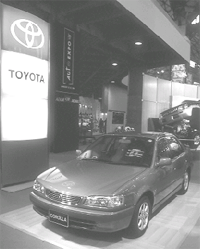The US pulls up Toyota
 the us government has filed a suit against Toyota Motor Sales usa , a subsidiary of Toyota, accusing it of equipping 22 million cars with faulty emission control monitoring systems. The federal government is seeking as much as us $60 billion in fines from the carmaker. However, Toyota in a statement has defended its cars and described the suit as "extremely regrettable.'
the us government has filed a suit against Toyota Motor Sales usa , a subsidiary of Toyota, accusing it of equipping 22 million cars with faulty emission control monitoring systems. The federal government is seeking as much as us $60 billion in fines from the carmaker. However, Toyota in a statement has defended its cars and described the suit as "extremely regrettable.'
This is the latest in a series of similar disputes pitting the government against automakers. In each case, the government has contended that the computer diagnostic equipment was programmed to meet federal standards during laboratory tests but not during actual driving on the road.
What sets the Toyota case apart is the company's decision to fight the government in court. Christine Romano, a justice department spokesperson, said that under the Clean Air Act, Toyota could face a fine of us $25,000 to us $27,500 for each of 2.2 million vehicles that allegedly failed to comply, depending on when each vehicle was sold.
However, the maximum possible penalty is quite unlikely. The law directs judges to consider a company's economic gain from pollution, its previous environmental record and its ability to stay in business if it pays the maximum fine. Toyota has a good environmental record, its gains from the alleged pollution are unclear, and the maximum fine would equal eight months of its global sales.
The dispute involves the vehicles' so-called evaporative emissions of unburned gasoline, which contribute to smog. Toyota contends that the state and federal rules require vehicles' emission control systems to meet tests only in laboratories. Tiny quantities of gasoline fumes constantly escape from the vehicle's and from joints in the gasoline tank and fuel lines. These losses are monitored periodically.
A warning light is supposed to go on when pressure falls while the ignition is on. The rules do not give regulators the authority to conduct random checks, as they have done, on whether the vehicles actually perform on road the way they do in the laboratory, said Joseph Tetherow, a company spokesperson.
The vehicles "only had to meet lab tests,' Tetherow added. "They said it was in compliance and gave their approval before we went ahead and put it in our vehicles,' he added.
"Toyota continues to be disappointed that despite our vehicles having the best in-use emission performance in the industry, this matter has not yet been resolved in a mutually agreeable manner,' said T Jimolson, senior vice-president for Toyota motor sales usa .
